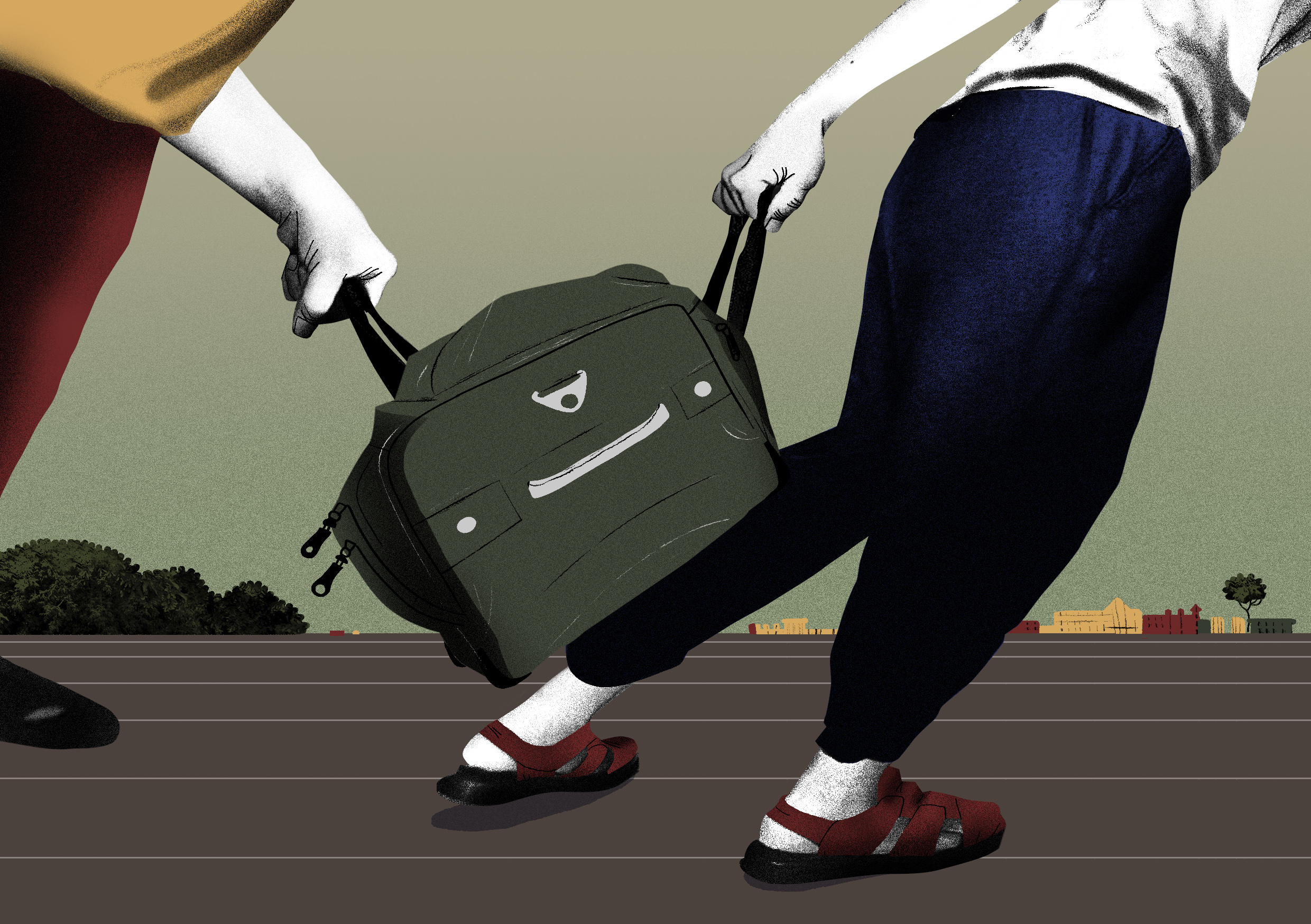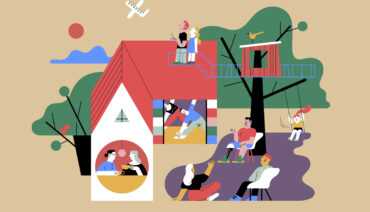Event announcement

Due to Russia’s full-scale invasion of Ukraine, many Ukrainians were forced to leave their communities and seek protection in safer regions, either within Ukraine or abroad. Many of them have now been residing in new communities for over a year. During this time, they have started adapting to their new living conditions – integrating into the communities, seeking permanent employment, and housing. They are also considering future plans, deciding whether they will return to their former place of residence or remain in their new one. For instance, approximately half of those who have found refuge in Germany attend German language courses and take an active part in society. A quarter of those who are now in Germany intend to stay there permanently. In Ukraine, according to SG “Rating”, as of June 2023, 19% of internally displaced people plan to stay permanently in the communities where they live now. Thus, long-term strategies are needed to involve displaced people in municipal decision-making in oder to help them to integrate into the new communities even if they plan to return to their own community once hostilities are over.
Creating such comprehensive, long-term strategies requires a detailed needs analysis and involvement of displaced people in decision-making by regular consultations with them. Municipalities in Ukraine and Germany have been implementing participatory practices, such as advisory organisations of displaced people (Ukraine) and migrant advisory councils (Germany). During our second event, we will discuss local experiences of Ukraine and Germany in developing enduring strategies for the participation and integration of displaced people.
We aim to bring together municipalities and civil society from both countries and discuss their experience in emergency response providing. Our event will be focused on:
- How are long-term strategies for support and integration of displaced persons developed?
- Which good practices for the participation of displaced people already exist in Germany and Ukraine?
- What is the role of the diaspora in building bridges between communities and integrating displaced people?
Speakers:
- Nataliya Pryhornytska, Co-founder of the Alliance of Ukrainian Organisations;
- Julia Portnowa, Officer for Participation at Berlin’s Integration Commissioner Office in the Senate Department for Labour, Social Affairs, Equality, Integration, Diversity and Anti-discrimination;
- Valeriia Vershinina, Director on Legal Affairs, CF "SSS";
- Anastasiya Perepelytsia, Member of the IDP Council of Zaporizhzhia.
The workshop will take place at Zoom platform. On Wednesday, 20 September 2023 (15:00-16:30 CET, 16:00-17:30 UTC+3).
In order to participate in the event and be able to join the discussion, please register using this link.
This workshop is organised by the German umbrella organisation for migrant organisations moveGLOBAL e.V. and the Ukrainian think tank Cedos as a part of a series of online events on "Strengthening the Participation of Displaced People and Migrants in Municipal Decisions on Emergency Assistance and Integration" as part of the Cross Culture Synergy programe funded by the Institute for Foreign Cultural Relations (IFA).
Event video
Event summary
Berlin’s Integration and Migration Policy: Participation of Displaced People from Ukraine
Speaker: Julia Portnowa, Officer for Participation at Berlin’s Integration Commissioner Office in the Senate Department for Labor, Social Affairs, Equality, Integration, Diversity and Anti-discrimination
The Berlin Senate Commissioner for Integration and Migration and her department deal with cross-departmental issues related to participation and integration in Berlin. Katarina Niewiedzial has been the Berlin Senate Commissioner for Integration and Migration since May 2019. The department is responsible for the shaping of the migration and integration policy of the Senate of Berlin and to coordinate with other administrations in the state of Berlin. Integration is a cross-sectional task, i.e., all policy areas and thus all Senate administrations bear equal responsibility for this area. The Commissioner is responsible for steering Berlin’s entire integration policy.
In general, the department of the Berlin Senate Commissioner for Integration and Migration tries to overcome the term “integration” which is often associated with assimilation and has a negative connotation. Instead, the department uses the term “participation”. They strive for a participatory approach to develop policies in cooperation with migrant representatives and migrant organisations as set down in the Participation Law (Partizipationsgesetz PartMigG). The goals of the Participation Law include the visibility and representation of people with a migration history in administration and their greater political participation. In general, the department advocates for the use of terms which are more inclusive such as migration history instead of migrants or migrant background. The term migration history means that people can have a history of migration and even being born in Germany but still are facing experiences of discrimination or exclusion because of their skin colour or appearance.
In cooperation with Ukrainian diaspora and refugee organisations the Berlin Senate Commissioner for Integration and Migration and her department aim to centre polices and regulations which directly affect displaced people from Ukraine around their needs. Ukrainians who arrived after the full-scale invasion of Ukraine by Russia face different challenges such as finding decent housing, access to education, and integration into the job market. In all these areas the department tries to support Ukrainians and to address these challenges in other departments of the Berlin Senate as well. A corner stone of Berlin’s Integration and Participation policy towards displaced people from Ukraine is the already mentioned so-called “Action Plan Ukraine” which covers all aspects of everyday life and was developed with intensive cooperation with the civil society and especially Ukrainian-led NGOs. Another central support instrument is project funding for organisations which support the participation and integration process of Ukrainians in Berlin. For this reason, the department has created the “Mij Berlin” fund. In order to allow direct and active political and social participation of migrants, Berlin has also reformed its Participation Law in 2021.
Challenges and Opportunities of Participation from the perspective of the Alliance for Ukrainian Organisations in Germany
Speaker: Nataliya Pryhornytska, Co-founder of the Alliance of Ukrainian Organisations
The Alliance of Ukrainian Organizations is a coalition of Ukrainian civil society diaspora and non-governmental organisations. It was established after the annexation of Crimea by Russia in 2014. As an alliance it aims to speak with one voice to German politicians and decision-makers in order to guarantee meaningful participation of Ukrainians in the policymaking which directly affects them. The Alliance has 15 member organisations who are actively involved in humanitarian aid, youth support, political and advocacy work, and in the support of displaced people from Ukraine. All members of the alliance are volunteers. This means that it is often difficult to create sustainable structures and to fund different activities which are funded by temporary projects. The Alliance is also a member of the Berlin State Advisory Council for Participation which is a structure for the permanent exchange with the Berlin Senate on matters of participation and integration for migrants.
Nataliya Pryhornytska, who is the co-founder of the Alliance of Ukrainian Organizations, stressed that they also advocate for participation of people who might like to return to Ukraine after Ukraine’s victory in different networking and communication channels with policymakers. She believes it is important to give people who might only live temporarily in Germany the opportunity to shape their lives in Germany and to stand up for their home country when dealing with German political representatives. Besides the Berlin level, the Alliance is also consulting ministries and advocates for people who remain in Ukraine during the Russian military invasion. For example, they were involved in the development of the platform for reconstruction of Ukraine, which is a major project of the German government for the cooperation of different stakeholders from Ukraine and Germany in the process of reconstruction.
IDP Councils in Ukraine: how to strengthen the voice of IDPs and to build the dialogue with local society
Speaker: Valeriia Vershinina, Director on Legal Affairs, CF “SSS”
SSS has been supporting IDPs since 2014, when the first internally displaced persons appeared in Ukraine in the beginning of Russia’s invasion of Ukraine. This experience has helped in responding to the sharp increase in the number of IDPs in 2022, although many new challenges have emerged.
The SSS was working on the creation of the IDP Council concept before the full-scale Russian invasion of Ukraine. The main goal of such Councils is to involve IDPs in community life and in the development of their integration policy. The Councils also perform a number of other tasks: 1) trying to build a dialogue between IDPs and other groups in society in order to avoid conflicts and the spread of stereotypes, 2) working to increase awareness of the rights of IDPs, 3) promoting the personal and professional development of Council members.
There are three ways to join the activities of the IDP Council, depending on the situation in the community:
- Writing an application for joining if the recruitment of members is still ongoing
- Uniting with active IDPs to create a Council, if it has not yet been established in the community
- If the recruitment of Council members has already ended, joining as an expert or guest.
The activities of the IDP Councils are coordinated by Resolution of the Cabinet of Ministers of Ukraine No. 812 dated August 4, 2023. However, the regulations on the activities of the Councils and their powers are currently being refined. Different dialogue platforms are being organised to develop the best solutions for the strategies of the Councils’ activities. SSS also promotes interaction between IDP Councils of different communities, exchange of experience between them, training on attracting funding, strategic planning of activities.
The experience of creating the IDP Council in Zaporizhzhia, Ukraine
Speaker: Anastasiya Perepelytsia, Member of the IDP Council of Zaporizhzhia
The Council of Internally Displaced Persons under the Zaporizhzhia Mayor was established in 2019. The initiators were resettled women who lived in the city. At that time, it seemed that all humanitarian needs had already been met and people were adapting to living in a new place. However only basic needs were met, on the other hand, housing issues had no long-term solutions, and there were problems with voting rights.
The first step of the IDP Council’s activity was an audit of local programs for the availability of state services and services for IDPs. Some programs were not available to IDPs due to lack of resident registration. Activities were also started to create new mechanisms for providing housing, issues of observing electoral rights were raised.
In the first year after Russia’s full-scale invasion of Ukraine, the Council was mainly involved in humanitarian aid. In addition, there was a need to update the composition and focus of activities, because new IDPs appeared who had slightly different contexts and needs.
Life hacks for creating an effective IDP Council based on the experience of the IDP Council in Zaporizhzhia:
- Have an intention, know why the Council is being created, and what it will do. Actively cooperate with local authorities and the community
- Plan your activities and be active in making proposals, justify your proposals with facts and analytics
- Maintain gender and age balance. Involve people with disabilities. This is necessary to ensure that the interests of all groups are represented.
- Increase your capacity through training, exchange of experience
- Understand that integration is a mutual process. That is why the interaction of both parties—the IDP and the host community—is needed. It is also important to maintain the understanding that not only IDPs have problems, but the local community also faces challenges, in particular due to the increase in population.
This workshop is organised by the German umbrella organisation for migrant organisations moveGLOBAL e.V. and the Ukrainian think tank Cedos as a part of a series of online events on “Strengthening the Participation of Displaced People and Migrants in Municipal Decisions on Emergency Assistance and Integration” as part of the Cross Culture Synergy programe funded by the Institute for Foreign Cultural Relations (IFA).
Support Cedos
During the war in Ukraine, we collect and analyse data on its impact on Ukrainian society, especially housing, education, social protection, and migration








